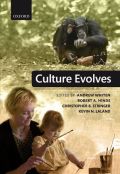
Culture evolves
Whiten, Andrew
Hinde, Robert A.
Stringer, Christopher B.
Laland, Kevin N.
Culture shapes vast swathes of our lives and has allowed the human species to dominate the planet in an evolutionarily unique way. This book is unique in focusing on the evolutionary continuities in culture, providing an interdisciplinary exploration of culture, written by leading authorities from the biological and cognitive sciences. Culture - broadly defined as all we learn from others that endures for long enough to generate customs and traditions - shapes vast swathes of our lives and has allowed the human species to dominate the planet in an evolutionarily unique way. Culture and cultural evolution are uniquely significant phenomena in evolutionary biology: they are products of biological evolution, yet they supplement genetic transmission with social transmission, thus achieving a certain independence fromnatural selection. However, cultural evolution nevertheless expresses key Darwinian processes itself and also interacts with genetic evolution. Just how culture fits into the grander framework of evolution is a big issue though, yet one that has received relatively little scientific attentioncompared to, for example, genetic evolution. Our 'capacity for culture' appears so distinctive among animals that it is often thought to separate we cultural beings from the rest of nature and the Darwinian forces that shape it.'Culture Evolves' presents a different view arising from the recent discoveries of a diverse range of disciplines, that focus on evolutionary continuities.First, recent studies reveal that learning from others and the transmission of traditions are more widespread and significant across the animal kingdom than earlier recognized, helping us understand the evolutionary roots of culture.Second, archaeological discoveries have pushed back the origins of human culture to much more ancient timesthan traditionally thought. These developments together suggest important continuities between animal and human culture. A third new array of discoveries concerns the later diversification of human cultures, where the operations of Darwinian-like, cultural evolutionary processes are increasinglyidentified. Finally, surprising discoveries have been made about the imprint of cultural evolution in children's predisposition to acquire culture.The result of a major interdisciplinary meeting held by he Royal Society and the British Academy, this book presents the work of leading experts from the fields of ethology, behavioural ecology, primatology, comparative psychology, archaeology, anthropology, evolutionary biology and developmental psychology. INDICE: Introduction Exploring the costs and benefits of social information use: an appraisal of current experimental evidence From fish to fashion: experimental and theoretical insights into the evolution of culture Social learning in birds and its role in shaping a foraging nice Social learning and the development of individual and group behaviour in mammal societies Social traditions and social learning in capuchin monkeys (Cebus) The scope of culture in chimpanzees, humans, and ancestral apes Social learning and evolution: the cultural intelligence hypothesis The evolution of primate general and cultural intelligence The origins of stone tool technology in Africa: a historical perspective Culture and cognition in the Acheulian industry: a case study from Gesher Benot Ya'aqov Stone toolmaking and the evolution of human culture and cognition Evolution, revolution or saltation scenario for the emergence of modern cultures Descent with modification and the archaeological record The evolution of the diversity of cultures Language evolution and human history: what a difference a date makes How do we use language? Shared patters in the frequency of word use across 17 world languages Mode and tempo in the evolution of socio-political organization: reconciling 'Darwinian' and 'Spencerian' evolutionary approaches in anthropology How copying affects the amount, evenness, and persistence of cultural knowledge: insights from the social learning strategies tournament What drives the evolution of hunter gatherer subsistence technology? A reanalysis of the risk hypothesis with data from the Pacific Northwest On the nature of cultural transmission networks: evidence from Fijian villages for adaptive learning biases Natural pedagogy as evolutionary adaptation The scope and limits of overimitation in the transmission of artefact culture Social learning among Congo Basin hunter-gathers Young children's selective trust in informants
- ISBN: 978-0-19-960896-6
- Editorial: Oxford University
- Encuadernacion: Cartoné
- Páginas: 480
- Fecha Publicación: 22/12/2011
- Nº Volúmenes: 1
- Idioma: Inglés
